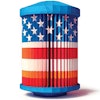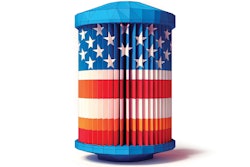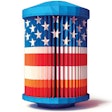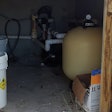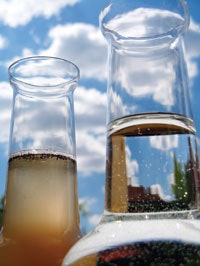
But when it comes to chemicals, it's a little harder to deliver the message. Chemicals are seen as anti-green, patently unnatural and something to be avoided, though those notions are largely misguided.
"Some of the products we manufacture are, by their nature, toxic," says John Peutz, vice president of research and development for Advantis Technologies, Alpharetta, Ga. "But they need to be in order to do their job, which is to mitigate pests.
"And not all pesticides can be what you would consider to be biodegradable, compatible with the environment, having no imprint on the earth. That's just not going to happen. By their nature they're going to be effectual in destroying viruses, they're going to be effectual in killing bacteria. Those things are required, in fact, to keep us healthy."
Peutz also points out that to label something as natural is not the same as labeling it as safe. Take a cobra, for example. About as natural as it gets, right? "But if it bites you, it's deadly," he says. "And that venom it's injecting? Also incredibly natural."
Tough Spot
Given the fact that spa chemicals are basically required to be toxic, what's a dealership that wants to position itself as a provider of green solutions to do? Does the topic need to be avoided? Hardly.
According to Peutz and others we spoke with, dealers can present spa chemicals in a flattering green light by stressing that customers will be using less chemicals if they keep their water balanced, by offering some truly green alternatives to cut down on chlorine or bromine use, and by tapping into customers' green feelings by emphasizing green packaging and manufacturing practices.
In the end, though, customers need to know that chemicals can't be taken out of the hot tub completely.
"I think people are very sensitive about soaking in a vat of chemicals. They're also very sensitive to hassles - the hassles of testing and measuring," says Alice Cunningham, co-owner of Olympic Hot Tub Company in Seattle. "So while you want to simplify maintenance, you want to make it sanitary and keep the sanitizer level up so they don't get critters or anything in their tubs."
Packaging And Processes
Chemicals may not easily fit a standard definition of green, but if one looks closely, there are shades of green to be found. It all depends on how you define it. To some, being green is more of a process than an outcome.
At Olympic Hot Tub Company, Cunningham sells SeaKlear, which she says allows her to easily promote overall greenness to her customers.
"They're a local company, and a lot of their products are made in the Northwest, which is a great sell for us, because there's a smaller footprint associated with that," she explains. "Plus every bottle is recyclable."
And recycling in her hometown is something of a local obsession. Other parts of the country may not be as strident about it, but recycling is hardly viewed as a kooky idea anywhere these days.
"It's something all dealers should really take a look at," she says.
Manufacturers - including Advantis - are certainly looking at it.
"There are methodologies you can use in the manufacture of chemicals that are considered green," Peutz explains. "And there's energy conservation, putting product in ecologically friendly packaging.
"Each of these things allows you to consider your product green, because somewhere along the line, when you were putting it together, steps were taken to make sure you were being responsible to the environment."
For its part, Advantis recycles its wastewater, recycles all its paper, and recycles the packaging material that isn't used.
"So in the manufacture of all of our products, you would regard the process as green," he says.
So it turns out a definition of green is elusive, and that it lies largely in the eye of the beholder. All chemical manufacturers do things a little differently, laying claim to the green banner in different ways. For one dealer, recycled packaging may be a successful hook. For another, it may be proximity to the manufacturing plant and the reduced fuel cost associated with transportation. No matter which line you sell, though, there's a good chance the supplier is at least as aware as your customers about the importance of environmental stewardship. The trick is learning what you can about your suppliers, then passing that on to concerned customers.
Alternatives And Additives
"Somebody could say, 'We didn't cut down a tree to make our product packaging,'" says Burt Claxton, director of sales and marketing for The Natural Hot Tub Company, Roanoke, Va. "It's not necessarily as simple as that. But anytime you can be aware of the water you're draining and what you're putting into it, that has a lot to do with being green."
Claxton's company produces a line of spa treatment products that uses a proprietary formulation of enzymes to help remove organic contaminants and balance pH and alkalinity. Claxton is careful to point out that enzymes don't replace chlorine or bromine, and that oxidizers are still needed to keep spa water clean, clear and, above all, safe.
"Our Full Circle Program is something we really push," he says. "You can get by with less work and less chemicals, and then be able to drain that water safely out into the environment should you need to drain and refill."
Enzymes are just one of many products designed to reduce the need for oxidizers in hot tub water. Mineral purifiers emit small amounts of copper, zinc and silver to kill bacteria and prevent algae, while ozonators, now standard equipment on hot tubs, kill bacteria and remove it from the water.
All these alternatives assist in sanitizing, thus reducing the amount of chlorine or bromine needed in a hot tub.
But these products do require the user to maintain a sanitizer residual, and all manufacturers of these products admit there's no such thing as a "chemical replacement." Still, showing customers how they can at least reduce the amount of chemicals is a good way for a dealership to position itself as a strong partner in keeping spa water both clean and safe without using more chemicals than is necessary.
Maintenance Matters
While a dealer well versed on eco-friendly processes, selling product packaging that's recycled or recyclable, and encouraging the use of minerals and enzymes may have a good green pitch, that dealer fails the customer if he or she doesn't bring up the importance of proper maintenance and its role in reducing chemical use. The concept is simple to understand and to explain to customers.
Say a hot tub owner displays a real distaste for chemicals, shows reluctance to use them regularly and then plays catch-up once the water goes awry.
He or she may think they've saved some money by keeping the chemicals capped. That homeowner would probably also pat him or herself on the back for sparing the environment from "harmful" chemicals. Those ideas are misguided at best, and dangerous at worst.
"One of the approaches we have taken with our spa category products and with our pool category products is to get people to understand that managing their water, that is taking care of their water, will be, in the long run, far more environmentally friendly than any items you can select to put in the water itself," Peutz explains. "By that I mean putting programs in place for managing your hot tub so that you are routinely doing the very simple things, in very small amounts.
"It's much, much easier, for example, to prevent contaminating growth within a tub than it is to destroy it once its population has grown. So having the homeowner set up with simple systems with management tools and management products that reliably treat the water will be much more effective from a cost perspective and much more environmentally friendly."
Cunningham explains how she and her employees handle the spa chemical issue. Basically, it's a balancing act - you want to teach them that they can minimize their chemical use, but also underscore the idea chemicals are a crucial part of hot tub ownership.
"You want to say to the customer that what we're selling you are products that we've selected and believe to be safe," she says. "They'll also be effective, fast-acting and take care of your spa in the best possible way with the least hassle."




















